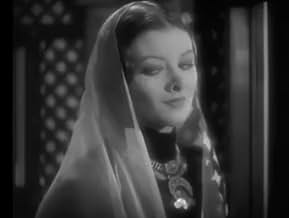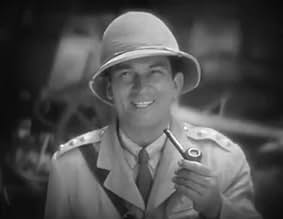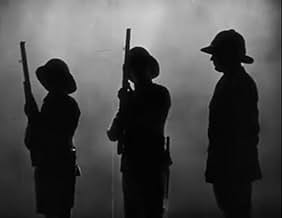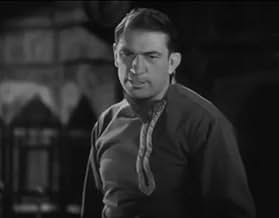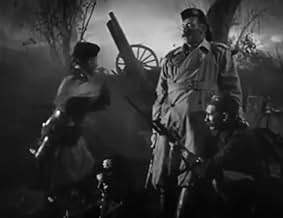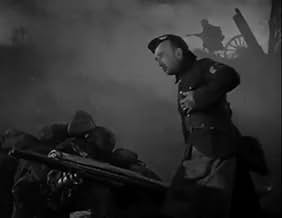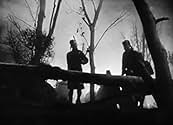VALUTAZIONE IMDb
5,6/10
552
LA TUA VALUTAZIONE
Aggiungi una trama nella tua linguaCaptain Donald King of the British Army goes to India just as World War I breaks out, convincing his comrades that he is a coward. In reality, he is on a secret mission to rescue British sol... Leggi tuttoCaptain Donald King of the British Army goes to India just as World War I breaks out, convincing his comrades that he is a coward. In reality, he is on a secret mission to rescue British soldiers held prisoner there.Captain Donald King of the British Army goes to India just as World War I breaks out, convincing his comrades that he is a coward. In reality, he is on a secret mission to rescue British soldiers held prisoner there.
- Regia
- Sceneggiatura
- Star
Claude King
- General in India
- (as Claud King)
Harry Allen
- Sandy
- (non citato nei titoli originali)
Frank Baker
- 42nd Highlander
- (non citato nei titoli originali)
William Begg
- 42nd Highlander
- (non citato nei titoli originali)
Arthur Clayton
- 42nd Highlander
- (non citato nei titoli originali)
Joseph Diskay
- Muezzin
- (non citato nei titoli originali)
Francis Ford
- Maj. MacGregor
- (non citato nei titoli originali)
Gregory Gaye
- 42nd Highlander
- (non citato nei titoli originali)
Recensioni in evidenza
Released in 1929, THE BLACK WATCH is an entertaining flick shot in black & white, and John Ford's first all-talkie film. It's based on the 1916 novel 'King of the Khyber Rifles' by Talbot Mundy.
Captain Donald King (McLaglen) goes undercover and leaves his regiment (Black Watch) to put down a rebellion in India at the at the start of WWI. There he finds the beautiful princess Yasmani (Loy) who plans to send her minions to attack British forces at the Khyber Pass.
As we would expect from a Ford movie it has a good look, especially the outdoor scenes. The Cave of Echoes scenes are well crafted with fine visuals and sound effects.
The problem the movie has is it's dialogue in many scenes, Myrna Loy's in particular, is stilted and stagy , as if they thought the mics couldn't keep up with their voices. Still, a good movie.
Captain Donald King (McLaglen) goes undercover and leaves his regiment (Black Watch) to put down a rebellion in India at the at the start of WWI. There he finds the beautiful princess Yasmani (Loy) who plans to send her minions to attack British forces at the Khyber Pass.
As we would expect from a Ford movie it has a good look, especially the outdoor scenes. The Cave of Echoes scenes are well crafted with fine visuals and sound effects.
The problem the movie has is it's dialogue in many scenes, Myrna Loy's in particular, is stilted and stagy , as if they thought the mics couldn't keep up with their voices. Still, a good movie.
By 1929 standards, "The Black Watch" is a decent film. When seen today, however, it seems very stilted and slow. But you cannot fault the movie for being so static and stagey, as in 1929 filmmakers were still struggling to integrate sound into movies...and it took them another year or two to get it right. In this case, it was the first sound film of John Ford...and it shows.
When the story begins, the officers of a Scottish Highlands regiment are having a party and toasting to their success in WWI...which has just begun. They see it as a chance for glory and fun and all that rot, but John Ford filmed this section with great sentimentality...as if to glorify the godawful mess that the war would soon become.
During this party, Captain Donald Gordon King (Victor McLaglen) is called to talk to his commander. He's ordered to go to India for an undercover mission instead of just getting his head blown off in France with his friends. And, because the film shows such patriotism and gung ho attitudes, Donald is sad to not get into the action!
Once in India, he's expected to insinuate himself into the inner circle around a strange and charismatic woman named Yasmani (Mynra Loy) who is plotting a rebellion in British India. To do this, he is publicly disgraced and runs to Yasmani's camp...hoping that she and her men won't realize the whole disgraced thing is a sham. What's next? See the film and find out for yourself.
Technically, this is a very good film. The cinematography is exceptional and the sound for 1929 is excellent. The sets also are pretty amazing.
On the other hand, the film has a few deficits. None of the 'Indians' in the movie look the least bit Indian...with the likes of Walter Long and Myrna Loy playing natives!! Such silly casting wasn't unusual back in the day and Hollywood was still trying to figure out what to do with Loy...even casting her as a Chinese lady in "The Mask of Fu Manchu" only a few years later. In addition, although the sound quality is good, the acting combined with the sound isn't so hot. It's incredibly stilted and the acting stagy as well...not unusual for 1929 but obvious by the standards even of 1930-1932. Some scenes look as if they were from a silent movie, stylistically speaking. This is especially true when the Captain was pitching woo with Yasmani....the acting of both (particularly Loy) was truly awful!! As a result, the scope and excitement that should be in the story are sadly lacking at times. Overall, well worth seeing but probably a bit of a disappointment for Ford fans. My score of 4 might seem a bit high, but it is watchable and I tend to cut the films of 1927-29 some slack because of changing technologies and styles.
When the story begins, the officers of a Scottish Highlands regiment are having a party and toasting to their success in WWI...which has just begun. They see it as a chance for glory and fun and all that rot, but John Ford filmed this section with great sentimentality...as if to glorify the godawful mess that the war would soon become.
During this party, Captain Donald Gordon King (Victor McLaglen) is called to talk to his commander. He's ordered to go to India for an undercover mission instead of just getting his head blown off in France with his friends. And, because the film shows such patriotism and gung ho attitudes, Donald is sad to not get into the action!
Once in India, he's expected to insinuate himself into the inner circle around a strange and charismatic woman named Yasmani (Mynra Loy) who is plotting a rebellion in British India. To do this, he is publicly disgraced and runs to Yasmani's camp...hoping that she and her men won't realize the whole disgraced thing is a sham. What's next? See the film and find out for yourself.
Technically, this is a very good film. The cinematography is exceptional and the sound for 1929 is excellent. The sets also are pretty amazing.
On the other hand, the film has a few deficits. None of the 'Indians' in the movie look the least bit Indian...with the likes of Walter Long and Myrna Loy playing natives!! Such silly casting wasn't unusual back in the day and Hollywood was still trying to figure out what to do with Loy...even casting her as a Chinese lady in "The Mask of Fu Manchu" only a few years later. In addition, although the sound quality is good, the acting combined with the sound isn't so hot. It's incredibly stilted and the acting stagy as well...not unusual for 1929 but obvious by the standards even of 1930-1932. Some scenes look as if they were from a silent movie, stylistically speaking. This is especially true when the Captain was pitching woo with Yasmani....the acting of both (particularly Loy) was truly awful!! As a result, the scope and excitement that should be in the story are sadly lacking at times. Overall, well worth seeing but probably a bit of a disappointment for Ford fans. My score of 4 might seem a bit high, but it is watchable and I tend to cut the films of 1927-29 some slack because of changing technologies and styles.
John Ford is in my opinion the greatest director that ever lived, and he rarely ever made a misstep. Many people have listed The Black Watch as a misstep, but in context I do not think that it is. It is true that it is dated in the way that the dialogue is spoken, but find me one sound picture from 1929 that is not.
The problem was with sound pictures themselves, the movies had developed into near perfection in 1927-1928. But then sound became all the rage, and it wasn't profitable anymore for the studios to invest in silent movies. So the masterpieces of the late silent era were put on the back burner for stagy dramas with too much dialog or musicals even more stagy than the dramas.
The Black Watch has Ford's German expressionism influenced photography that he started in the late twenties after meeting F.W. Murnau. It also has the Ford themes of Integration into a society, self sacrifice, and the bond between men.
The one major drawback is the extremely stilted dialogue. No one really understood at the time how sound should be recorded live, which led to really irregular ways of saying lines. With long pauses between each others lines, since they did not want to step on each others' lines, so as to overwork the early microphones.
Victor McLaughlin's acting wasn't his best, but he was much better than Myrna Loy who honestly seemed as though she had been hypnotized before going on the set. I thought the guy who asked forforgiveness for his violence towards his fellow man, who would then do something violent was funny.
Compared to all of John Ford's other films this is near the bottom, but compared to everything else made in sound in 1929 this is at the top of the heap.
The problem was with sound pictures themselves, the movies had developed into near perfection in 1927-1928. But then sound became all the rage, and it wasn't profitable anymore for the studios to invest in silent movies. So the masterpieces of the late silent era were put on the back burner for stagy dramas with too much dialog or musicals even more stagy than the dramas.
The Black Watch has Ford's German expressionism influenced photography that he started in the late twenties after meeting F.W. Murnau. It also has the Ford themes of Integration into a society, self sacrifice, and the bond between men.
The one major drawback is the extremely stilted dialogue. No one really understood at the time how sound should be recorded live, which led to really irregular ways of saying lines. With long pauses between each others lines, since they did not want to step on each others' lines, so as to overwork the early microphones.
Victor McLaughlin's acting wasn't his best, but he was much better than Myrna Loy who honestly seemed as though she had been hypnotized before going on the set. I thought the guy who asked forforgiveness for his violence towards his fellow man, who would then do something violent was funny.
Compared to all of John Ford's other films this is near the bottom, but compared to everything else made in sound in 1929 this is at the top of the heap.
This might have fared better with a stronger leading character because, for my money, getting Victor McLaglen to play a captain in the Royal Scots engaging in some tribal Indian subterfuge was just a mission too far! Anyway, he is "King" who just as his regiment is heading for France is re-routed to the Northwest Territories of India on a top secret mission. His erstwhile colleagues view this as akin to desertion, but we know that his task to discover and destroy a massive arms dump that could spell doom and destruction for the Raj and rescue some hostages is something that this locally born man is best suited to do. Pretty effortlessly this six-foot gent finds and infiltrates the tribe and thanks to the sponsorship of it's high priestess "Yasmani" (Myrna Loy) manages to formulate a plan to thwart the cunning antics of the would-be revolutionaries. The last ten minutes or so bring the story alive and allow the engaging McLaglen to show us a little of the glint in his eye, but the rest of this is a remarkably stage-bound exercise that rarely ventures outdoors and rather than steeping us in end-to-end action, rather drowns us in end-to-end dialogue. Loy looks every inch the star, but more of the silent movies than a talkie as her poise is perfect but her pitch "will you obey my commands?" much less so. Inadvertently, perhaps, the conclusion also reminds us just how the tiny contingent of British soldiers did manage to subdue a population hundreds of times their number and of course there isn't a great deal of jeopardy as the story takes a bit too long to reach it's predictable end. I do like the genre, but this is just a bit too static an interpretation of derring-do to stick in the mind for long with some of the editing looking like it was done on a rollercoaster.
John Ford had notched up almost 50 films in the director's chair when he took on this project in the late 20's coinciding with the advent of sound.
Far less well known than its 1953 re-make (known AS KING OF THE KHYBER RIFLES) with Tyrone Power in the Victor McLlaglen role, the story is that of British Army Officer Captain King, who encounters way more than he expected when he is asked to put down an Indian rebellion up around the Khyber Pass.
Very dated now and without the benefit of wide screen color which so enhances desert dramas especially, BLACK WATCH is still an interesting time-capsule. I saw it many years ago on late night TV, both to compare with the later version and to see how John Ford's direction held up in 1929. On both counts, the film scored well!
Far less well known than its 1953 re-make (known AS KING OF THE KHYBER RIFLES) with Tyrone Power in the Victor McLlaglen role, the story is that of British Army Officer Captain King, who encounters way more than he expected when he is asked to put down an Indian rebellion up around the Khyber Pass.
Very dated now and without the benefit of wide screen color which so enhances desert dramas especially, BLACK WATCH is still an interesting time-capsule. I saw it many years ago on late night TV, both to compare with the later version and to see how John Ford's direction held up in 1929. On both counts, the film scored well!
Lo sapevi?
- Citazioni
General in India: Forget your schoolboy scruples. This is war.
- ConnessioniFeatured in Hollywood (1980)
I più visti
Accedi per valutare e creare un elenco di titoli salvati per ottenere consigli personalizzati
- How long is The Black Watch?Powered by Alexa
Dettagli
- Data di uscita
- Paese di origine
- Lingua
- Celebre anche come
- King of the Khyber Rifles
- Azienda produttrice
- Vedi altri crediti dell’azienda su IMDbPro
Botteghino
- Budget
- 400.000 USD (previsto)
- Tempo di esecuzione1 ora 33 minuti
- Colore
Contribuisci a questa pagina
Suggerisci una modifica o aggiungi i contenuti mancanti

